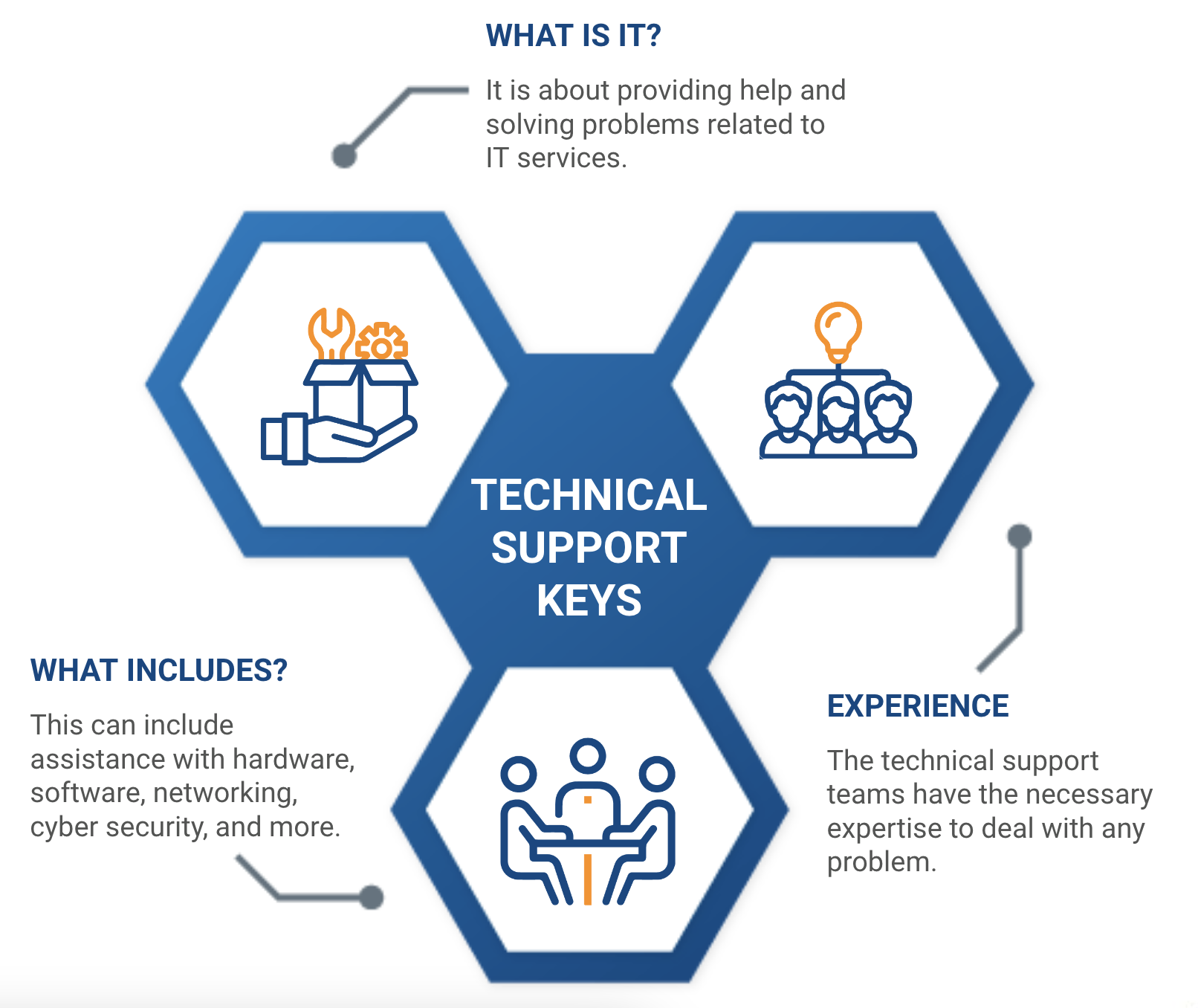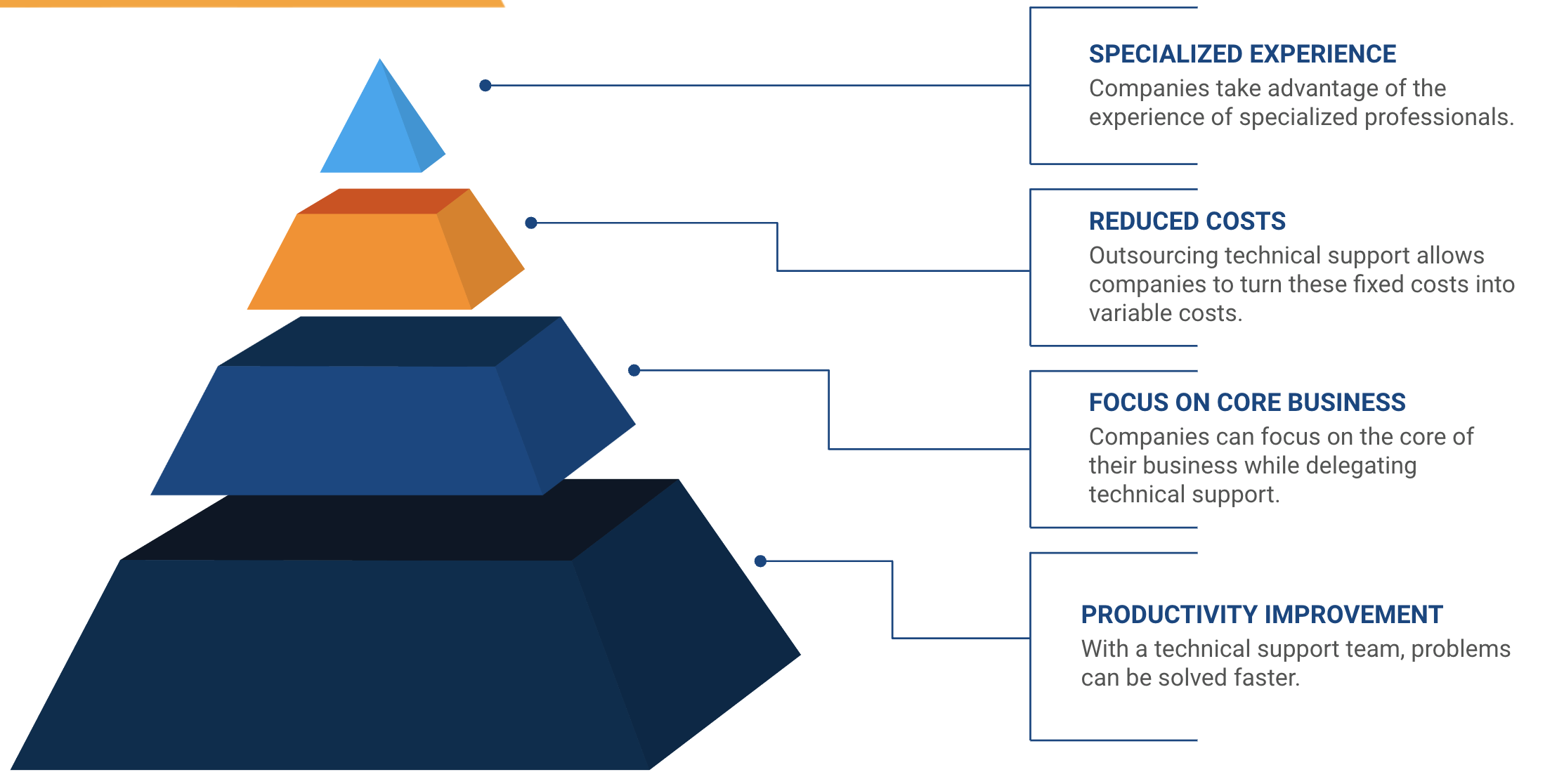
In today's digital age, businesses of all sizes are constantly challenged to keep up with the latest technologies while balancing efficiency and profitability.
For many organizations, IT outsourcing has become an essential strategy to meet these ever-evolving demands. Among a variety of IT services available to outsource, one stands out as the most common: technical support.
In this article, we'll explore why help desk is the most commonly outsourced IT service, the associated benefits and challenges, and how businesses can make informed decisions about it.
What does technical support consist of in the IT service context?
Technical support, also known as help desk or helpdesk, is the process of providing help and solving problems related to IT services. This can include assistance with hardware, software, networking, cyber security, and more. As businesses increasingly rely on technology for their day-to-day operations, maintaining efficient and effective technical support has become essential.
“There's a reason so many IT professionals start their careers in help desk. Troubleshooting skills honed in the help desk provide you with a solid foundation that you will use again and again throughout your career, no matter what specialty you are in", they explained in an article on the CompTIA portal.

Reasons to outsource technical support through IT services
-
Specialized Experience
Technology is constantly evolving, and keeping up with the latest trends and solutions can be challenging for businesses. By outsourcing technical support, organizations can take advantage of the expertise of professionals specialized in various areas of IT services.
-
Reduced Costs
Establishing an internal technical support team can be expensive, as it involves hiring qualified personnel, investing in infrastructure, and ongoing training. Outsourcing technical support allows companies to turn these fixed costs into variable costs, which can be more profitable in the long run.
-
Focus on the Core Business
By outsourcing technical support through IT services, companies can focus their resources and energy on their core activities instead of being distracted by daily technical problems.
“If you want to expand your business, for example, technical outsourcing is cost-effective to address your growing work without compromising quality. Investing in an outsourced help desk team won't cost you much, even if you have an increasing workload. When you outsource, you can optimize productivity while increasing your ability to scale your outsourcing help desk functions”, they explained in an Outsource Accelerator article.

-
Availability 24/7
Many help desk outsourcing service providers offer 24/7 support. This ensures that companies can get help when they need it, which is especially valuable in a globalized world.
-
Productivity Improvement
By having a dedicated technical support team, issues can be resolved faster and more efficiently, reducing downtime and improving overall productivity.
-
Challenges and Considerations
Despite the benefits, outsourcing technical support also presents potential challenges:
Control: By outsourcing, companies give up some degree of control over their IT services. It is crucial to choose a reliable provider and establish strong agreements to mitigate this risk.
“When you outsource, a third party will take care of the technical support, which means that you will have practically no control over the quality of the service provided (...) when you outsource, you are not responsible for incorporating new resources. This means that you will have no idea if they are properly trained for the job or not (...) But don't worry, in most cases, outsourced agents are well trained and extremely professional", they detailed in an article from Time Doctor.
Data Security: Data security is a major concern. Outsourcing may involve the provider's access to sensitive information, which highlights the need to carefully evaluate the provider's security and privacy policies.
Efficient Communication: Clear and effective communication between the company and the supplier is essential. Expectations, procedures, and timelines should be clearly defined in service level agreements.
Quality of Service: The quality of technical support may vary depending on the provider. Researching the opinions of other customers and reviewing the provider's reputation can help ensure a high-quality service.
OTHER IT SERVICES THAT ARE IN HIGH DEMAND
Cloud Infrastructure Management:
The adoption of cloud services, such as Amazon Web Services (AWS) and Microsoft Azure, has led to an increase in outsourcing of cloud infrastructure management. IT service providers can manage servers, storage, networking, and security in the cloud, allowing businesses to take advantage of the cloud without the burden of managing infrastructure internally.

Cyber Security:
Cybersecurity is a critical concern today, and many companies lack the in-house expertise to protect against ever-evolving cyberthreats. Outsourcing cyber security services allows organizations to access highly-skilled security professionals and use advanced technologies to protect their systems and data.
Software Development and Maintenance:
Software development and maintenance are complex processes that require considerable technical expertise and resources. Outsourcing software development allows companies to get custom applications without the need to maintain an in-house development team. In addition, outsourcing can also speed up time to market.
Network management:
Network management includes tasks such as configuring, monitoring, and optimizing the network infrastructure. Since networks are essential for connectivity and data flow, many organizations outsource these services to ensure optimal performance and constant network availability.
IT outsourcing has proven to be an effective strategy for businesses to stay competitive in an ever-changing technology environment. While these five IT services are the most commonly outsourced, it is important for each organization to assess its specific needs before deciding which services to outsource. By doing so, companies can fully reap the benefits of outsourcing and improve their operational efficiency in the digital world.


